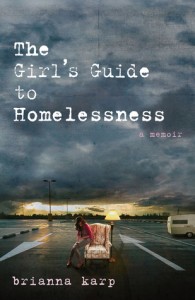 I wanted to like this book. Actually, I wanted to love this book. Sadly, Brianna Karp has done the unforgivable with The Girl’s Guide to Homelessness. She has forced me to defend Fox News.
I wanted to like this book. Actually, I wanted to love this book. Sadly, Brianna Karp has done the unforgivable with The Girl’s Guide to Homelessness. She has forced me to defend Fox News.
“Baby, you can’t watch this. This is Fox News. It’s not real news. No wonder ” I grabbed the remote from his hand before he could hurl it in Nancy Grace’s monologuing face. “How about we try a little CNN?” – Brianna Karp, TGGTH, 2011.
The most obvious problem is that Nancy Grace is not an employee of Fox News. If Nancy Grace is speaking, they are already watching CNN. The second is her tone. Her lover is making an error in his ignorance that she can make all better through her higher knowledge. Except she’s wrong. So she’s adopting this arch silly boy my culture let me show you it pose on a topic she knows nothing about. This isn’t a small error of fact, this is proof of fiction. I don’t doubt she and her lover watch television news. I do doubt the truth of Brianna Karp’s presentation of her life. She is simply too victimized and too noble and too good and those around her are too flawed and too evil and too everything else. As we used to say on the playground, “Get off the cross. We need the wood.”
Karp takes pains to show how much better she is than every single soul she knows. When her trailer is towed after a written warning, she is not at fault. She had a verbal statement from the local manager that the written warning was simply corporate’s posturing. Nothing to worry about! The little boss has said the big boss is all smoke! When her lover has a child with another woman, that woman is at fault for improper planning. When she has her own unplanned pregnancy*, the other woman is still at fault for manipulating her lover through their now present child. If only her lover had listened to her it would all be different! She knew what a problem that woman would be! (Insert her diatribe on how women don’t appreciate men after they give birth and the good men she’s seen wronged by crazy hormonal new mothers as a result. Oh yea, she goes there.) Her unemployed, cheating, unmedicated lover was just too sweet to see it. Wait a few pages though, he turns into a heartless monster who leaves her to die in the snow. Better to freeze than disbelieve, I suppose.
Karp starts off strong, but what begins as a journey into housing uncertainty (even she agrees she is not fully homeless) becomes a long list of ways she has done everything right only to be cruelly betrayed. This is a personality type I am more than a bit familiar with, so here Karp sets my BS meter off again. For example, the reader is supposed to believe that she is doing everything she can to change her situation, but Karp continually redirects money into nonessential areas. She also prides herself on not using programs meant to assist her into stable housing, because those are for people that need help, not people like herself. (Yet she’s willing to pursue Walmart for money after her illegally parked trailer is legally removed from their property. Go figure. She is absolutely one of those it’s the principle of the thing types.)
I felt tired after spending time with Karp. While the problem of homelessness and housing uncertainty is very real in America, Brianna Karp doesn’t offer much to the reader’s understanding of either. I believe a memoir from the other people in her life would illustrate a very different tale of a young life going wrong, and for that she has my compassion. What she doesn’t have is my endorsement. If her goal was to change one person, she’s changed me. I have often tried to explain my mother’s propensity for hoarding with the line “She probably has the wrappers from her first trip to McDonald’s.” Now that Karp has used a similar phrase I will have to move on. I never want to be accused of lifting from her material.
*I find a great deal about this unplanned pregnancy and the subsequent loss of her child troubling. If true, she shows herself to be a deeply damaged woman. If not true, she shows herself to be the same. No matter which way the reader decides the truth lies, the result is a fervent hope that no child is placed in her care. It is an uncomfortable judgement to make about a stranger, but it is an extraordinary series of events the reader is asked to accept.














